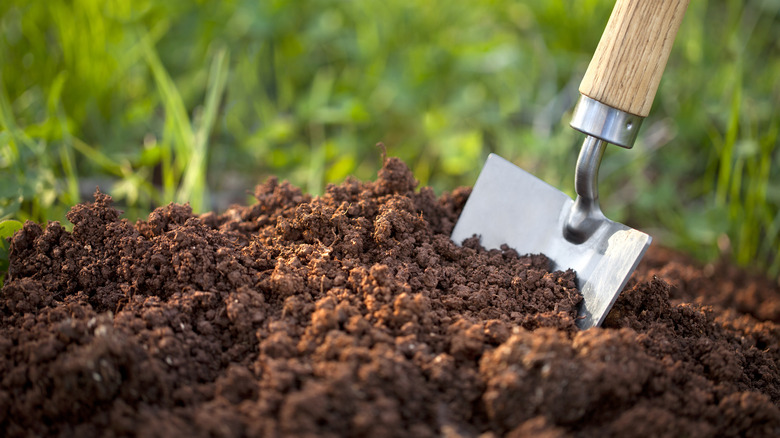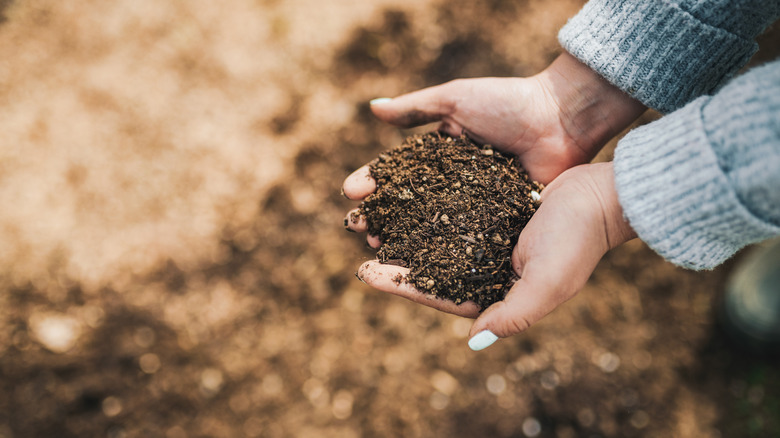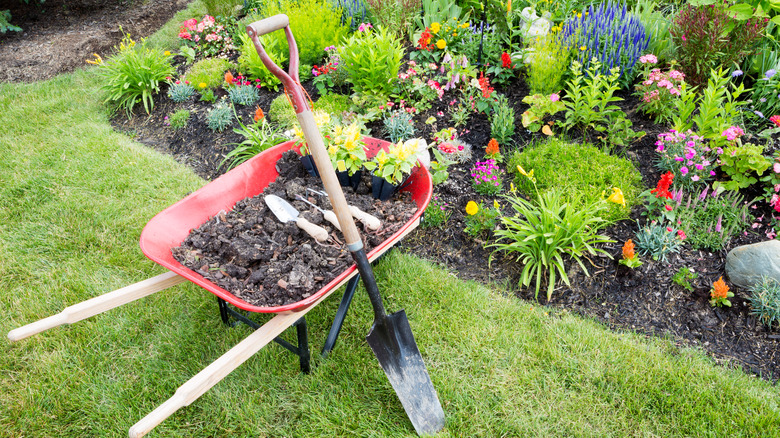How To Amend Store-Bought Soil To Improve The Life Of Your Plants, According To Our Professional Gardener
Whether you're growing flowers or vegetables, soil is the key to successful gardening. While some plants thrive best in specific kinds of soil, most plants do well in soil that's well-draining and that contains organic material. Gardeners who have clay soil that doesn't drain easily, or sandy soil devoid of nutrients, often use soil amendments to improve soil quality. If you purchase garden soil by the bag or the truckload, you know it's not always of high quality. There are a number of ways to improve the quality of store-bought soil by adding various amendments.
Garden soil is available in a variety of brands and forms. The bags available at nurseries and big box gardening centers are usually labeled for their suggested uses. Some contain basic topsoil, some are formulated for organic gardening, and some are specifically for growing certain plants like roses. The quality and contents of each bag vary from brand to brand. The most expensive soil tends to be organic garden soil that already contains amendments.
Generally the cheaper the soil, the less likely it is to have any amendments added to it — but you can add a variety of conditioners to store-bought soil to enrich it and improve its texture. You can purchase such amendments in bags, or you can use additions from your household, such as coffee grounds, wood ash, or compost from your compost tumbler.
What kind of amendments should I use?
Different soil amendments perform different functions. They can improve drainage and texture, add needed nutrients, or affect the pH level of the soil. Many gardeners need help to improve clay soil, which is heavy and doesn't have good drainage. Basic topsoil that comes in bags is often similar to clay soil, which has a moist feel and often sticks together in hard lumps. To give clay soil a better texture, closer to loam, you must add amendments such as compost, peat moss, coffee grounds, or wood ash.
Peat moss and coffee grounds will make the soil pH slightly more acidic: This is preferred for many plants and some fruits such as blueberries. Wood ash or lime will make soil more alkaline: Mediterranean soils tend to be more alkaline, so plants that grow well in these soils, such as lavender or dianthus, will benefit from these additions. Make sure the wood ash comes from natural wood, not treated wood.
Compost materials can vary and it may not be clear if the compost you acquire will make soil more acidic or more alkaline. Either way, compost definitely adds beneficial nutrients and texture to soil. The best general approach to choosing soil amendments is to add several different ones. You can add a bit of sand, too, but too much sand isn't a good match for hard clay soil.
How to amend store bought soil
The easiest way to amend your store-bought soil is to mix up a whole batch all at once. Using a wheelbarrow or a large plastic tote makes it a neater process, or you can mix it up near your garden beds if you're going to use it right away. Empty out the whole bag into the wheelbarrow. If your store-bought soil has hard lumps, break them up to help the amendments mix in more smoothly. Use hand tools like trowels or a gardening fork, and be careful as the hard lumps may need a bit of effort to break up.
Once the soil is broken up, you can then mix in your amendments. You can add them all at once or add one at a time, mixing after every addition using your trowel or fork. If you don't use up all the soil, keep it in a tote or, if it's in a small pile in your garden, cover it with a tarp or some plastic to keep it dry between uses.
You can try mixing up a smaller batch too, keeping your prepared soil in a tote with a lid and scooping out the amount you want to mix up with amendments (also kept in separate containers or in their original packaging). These products keep well for months so you can mix up a batch of amended soil in spring and keep using it throughout the season.


